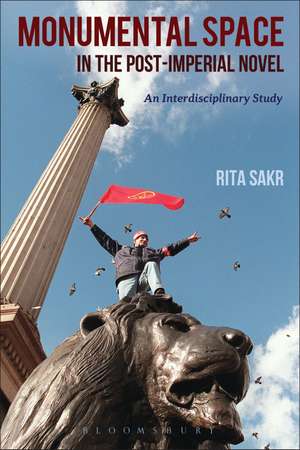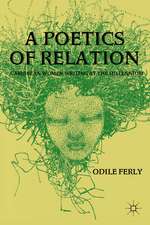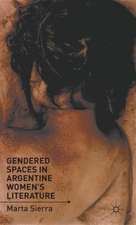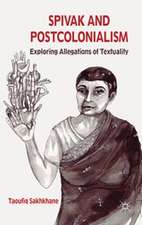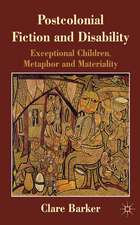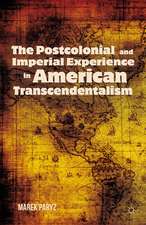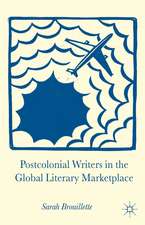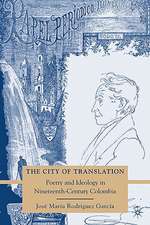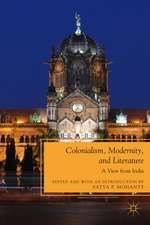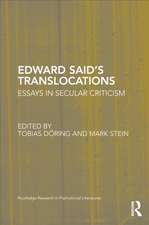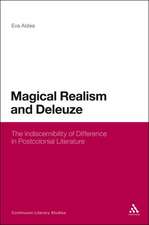Monumental Space in the Post-Imperial Novel: An Interdisciplinary Study
Autor Dr. Rita Sakren Limba Engleză Paperback – 17 iul 2013
| Toate formatele și edițiile | Preț | Express |
|---|---|---|
| Paperback (1) | 257.12 lei 43-57 zile | |
| Bloomsbury Publishing – 17 iul 2013 | 257.12 lei 43-57 zile | |
| Hardback (1) | 831.83 lei 43-57 zile | |
| Bloomsbury Publishing – feb 2012 | 831.83 lei 43-57 zile |
Preț: 257.12 lei
Nou
Puncte Express: 386
Preț estimativ în valută:
49.20€ • 51.50$ • 40.95£
49.20€ • 51.50$ • 40.95£
Carte tipărită la comandă
Livrare economică 31 martie-14 aprilie
Preluare comenzi: 021 569.72.76
Specificații
ISBN-13: 9781623565015
ISBN-10: 1623565014
Pagini: 256
Ilustrații: 22
Dimensiuni: 152 x 229 x 14 mm
Greutate: 0.35 kg
Editura: Bloomsbury Publishing
Colecția Bloomsbury Academic
Locul publicării:New York, United States
ISBN-10: 1623565014
Pagini: 256
Ilustrații: 22
Dimensiuni: 152 x 229 x 14 mm
Greutate: 0.35 kg
Editura: Bloomsbury Publishing
Colecția Bloomsbury Academic
Locul publicării:New York, United States
Caracteristici
Comparatively examines experimental techniques of narrating, representing, or writing monumental space.
Notă biografică
Rita Sakr is a Visiting Lecturer at University College Dublin, Ireland. She has published on Middle-Eastern studies, migrant writings, post-conflict literatures, and James Joyce. She is co-editor of James Joyce and the Nineteenth-Century French Novel (2011) and is co-editing The (1982) Siege of Beirut and the Ethics of Representation in Literature, Art and Journalism (forthcoming).
Cuprins
AbbreviationsList of Illustrations1. Reading Monumental Space at the Crossroads of Disciplines2. "broken pillars": Counter-Monumental Tactics in James Joyce's Ulysses3. Burning Temples and Falling Empires: Unraveling Arsonists' Dreams in Yukio Mishima's The Temple of the Golden Pavilion4. A History of Violence: Martyrs' Square and the Fractured Space of Memory in Rashid al-Daif's Dear Mr Kawabata5. Tabooed Spaces of Greatness and Shame: Monumentalization and the Representation of Terror and Trauma in Orhan Pamuk's The Black Book and SnowPostscript Post-2011: Monumental Space and the Collapse of Arab Dictatorships Selected BibliographyIndex
Recenzii
This highly engrossing study explores our paradoxical relation to monumental space as mediated by the post-imperial novel. It demonstrates the interplay between memorialisation and erasure, sacralisation and desecration, subservience and rebellious subversion, animism and petrification, combining fascinatingly detailed cultural and historical knowledge with illuminating and nuanced theoretical reflection. Rita Sakr not only reveals the transformative potential of monumental space but transforms our understanding of it through the original and timely ways in which she co-inflects the monumental with the post-imperial and brings a thought-provoking literary articulation to bear on the field of cultural geography.
This is an incisive and sophisticated intervention into the thrumming theoretical space around monuments and their relations to memory, history, power and art. With an astounding grasp on both major 20th-century novels (by Joyce, Mishima, al-Daif and Pamuk) and cultural theory (of Nora, Lefebvre, Mitchell and others), and always alert to the particular complexities of individual post-imperial contexts -- whether Irish, Japanese, Arabic or Turkish -- Sakr confidently builds a compelling set of arguments about how literature shapes the ways we experience and think about monuments. From a unique transnational perspective, she generates an original interdisciplinary method, brilliantly bringing together literature and theory. A stunning debut.
In this magisterial and compelling study, Rita Sakr reveals the degree to which the questioning of the status of memorials is a modern obsession and brilliantly uncovers the cross-cultural connections between writers as diverse as Joyce, Pamuk, Mishima, and al-Daif in their fictional interrogations of public forms of commemoration. Her richly nuanced readings, which deftly intermarry historical, philosophical, and cultural geographical insights, startlingly demonstrate that the counter-memorial and the deconstructed monument are more attuned with modern tastes and values than any heroicizing tributes.
This is an incisive and sophisticated intervention into the thrumming theoretical space around monuments and their relations to memory, history, power and art. With an astounding grasp on both major 20th-century novels (by Joyce, Mishima, al-Daif and Pamuk) and cultural theory (of Nora, Lefebvre, Mitchell and others), and always alert to the particular complexities of individual post-imperial contexts -- whether Irish, Japanese, Arabic or Turkish -- Sakr confidently builds a compelling set of arguments about how literature shapes the ways we experience and think about monuments. From a unique transnational perspective, she generates an original interdisciplinary method, brilliantly bringing together literature and theory. A stunning debut.
In this magisterial and compelling study, Rita Sakr reveals the degree to which the questioning of the status of memorials is a modern obsession and brilliantly uncovers the cross-cultural connections between writers as diverse as Joyce, Pamuk, Mishima, and al-Daif in their fictional interrogations of public forms of commemoration. Her richly nuanced readings, which deftly intermarry historical, philosophical, and cultural geographical insights, startlingly demonstrate that the counter-memorial and the deconstructed monument are more attuned with modern tastes and values than any heroicizing tributes.
